![]()
The Charlotte News
Thursday, March 16, 1944
FOUR EDITORIALS
![]()
![]()
Site Ed. Note: The front page reports that the Fifth Army entered Cassino in the wake of the previous day's devastating raid, dropping 2,500 tons of bombs on an area comprising less than one square mile. The soldiers reported that few buildings were left standing, that the location of the streets could not be discerned from where the buildings had once stood. Soldiers on scene at the time of the bombing sorties indicated that the Nazis had begun running with the second wave, escaping to dugout shelters outside of town. Adding to the confusion, it had rained for most of the night, turning the streets to mud.
Below are five pictures, the first of which shows the bombing of the previous day in progress, and the other four, the ruins encountered by the returning American and British troops surveying the town, including one showing an active Nazi machine-gun nest, whether taken before or after the March 15 devastation being unknown.
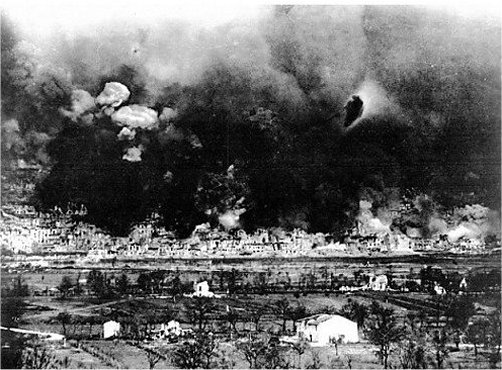
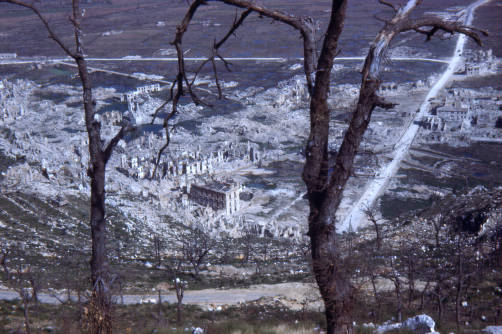
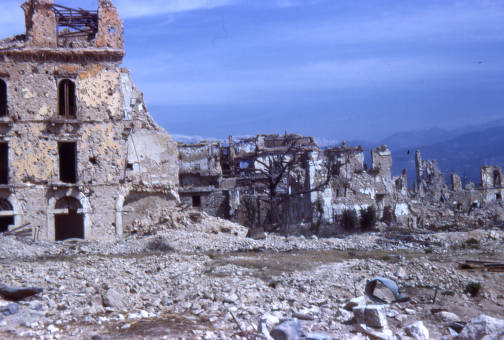
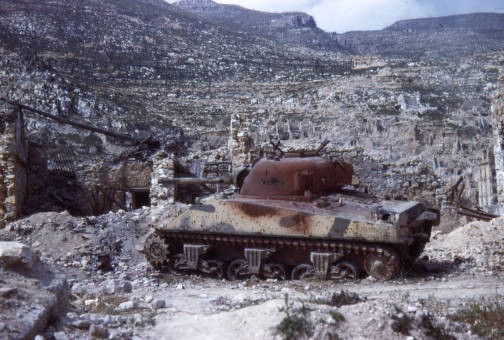
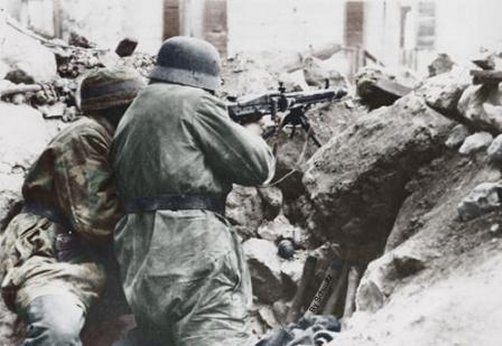
The RAF made a record bombing raid the previous night on Stuttgart, Munich, and other targets in northwest Germany, as well as hitting railroad yards at Amiens, France, dropping in all more than 3,360 tons of bombs from more than a thousand four-engined bombers. The British suffered forty lost bombers.
Another large U.S. raid took place this day on undisclosed targets. The previous day's medium raid on Brunswick in Germany had cost but three bombers.
Some 500 tons of bombs were dropped in the Southwest Pacific area, concentrating on Wewak on New Guinea, on Bougainville in the Solomons, and on targets in the Eastern Carolines, including a new target not previously struck, Oroluk Atoll, 150 miles east of Truk.
In Russia, the Red Army had captured Vapnyarka, after cutting the Lwow to Odessa railroad, 25 miles east of the border with Bessarabia.
It was announced that two flying aces of the Pacific theater, Col. Neal Kearby of San Antonio, recipient of the Congressional Medal of Honor for his actions on October 11, and Lt. Col. Thomas Lynch of Catasauqua, Pa., were killed in action. Col. Kearby, leader of the "Headhunters" air squadron, had 21 kills to his credit while Lt. Col. Lynch had 19.
The U. S. Army newspaper Stars and Stripes reported that during the operation in Sicily in July and August, some twenty American C-47 transport planes had been shot down by friendly fire in the fog of war. Secretary of War Henry Stimson indicated that there had been reports of such friendly fire incidents in Sicily, but could not confirm any numbers.
The prisoner exchange ship Gripsholm had arrived in Jersey City, where passengers previously interned by the Nazis stepped to freedom.
James King, in the "Reporter's Notebook" column, indicates that it was the little things which the solders remembered more than the horrors of war or the grand strategies. Example was the chaplain conducting a burial service during an air raid. While the men busily dug the graves at the insistent urging of the chaplain, the bombs began to fall close by. Nevertheless, the men continued to dig. Finally, the graves dug, the chaplain stated, as the bombs fell more furiously, "Bury them fast and we will pray later."
It might be noted that decades ago, the concept of "irreconcilable differences", without the necessity of citation of particular facts to support cause for divorce, germinated in the law of most states to avoid just the sort of tawdry allegations, usually made in boilerplate without much, if any, factual basis, contained in Mrs. Elliott Roosevelt's petition for divorce from her husband. In those times, to obtain divorce, the petitioning party had usually to allege some form of extreme mental cruelty to qualify for the court's intervention to sever the marriage vows. Thus, no one should stand up and cheer Mrs. Roosevelt's seeming independence of mind in asserting her harsh treatment at the hands of her husband. In all likelihood, he probably did little more than read the newspaper and ignore her.
She was pretty though, don't you think?
On the editorial page, "Prodigal" chronicles the litany of faux pas and stumbles in public relations committed by former UNC football coach Carl Snavely during his two season tenure in 1934 and 1935, when he compiled records of 7-1-1 and 8-1, respectively, prior to departing for greener pastures economically at Cornell. Rumor now had it that Ray Wolf, who had resigned as head coach after the 1941 season to join the Navy, would be permanently replaced by Mr. Snavely. But he was earning $12,000 per year at Cornell and thus unlikely to be lured to a lower paying job at the University. He, himself, had denied the rumor.
Nevertheless, the piece proceeds to list the many problems the former coach had while at Carolina. Among them was his contention in 1935 that Duke had beat Carolina by use of motion pictures. Duke coach Wallace Wade had lodged an official protest in opposition to Snavely coaching from the bench and Snavely was officially arrested from doing so.
And we have no idea what that means.
Besides, it is now time for the NCAA basketball tournament and we have no interest in middle March in looking at football matters, even as it might pertain to the Magical Campus.
Suffice it to say that Mr. Snavely would eventually take the job, but not until the 1945 season. He would coach the most famous football player in UNC history, Charlie Justice, and led the Tar Heels to four successful seasons, 1946 through 1949, including three major bowl games, two Sugars and one Cotton. His last three teams, however, suffered poor records and he left the program for good at the end of 1952.
Ray Wolf became head coach at the University of Florida after the war, but, with unimpressive results, was fired after four seasons. He then coached for two years at Tulane with a like record.
Come to think of it, while not, strictly speaking, applicable to football as played inside Wallace Wade Stadium, as far as Cameron Indoor Stadium goes, those moompicters they use behind the opponent's goal, especially during free throws, to distract shooters, not to mention regulation of the toombmostat, might serve to lend credence to Mr. Snavely's remark re football as played at Duke in dose days.
Still and all, we cannot understand what the problem was with Mr. Snavely coaching from the bench.
--Paint job, 'ey?
--No, it's just a spray job.
"Medicine" discusses efforts to overhaul the ailing medical system. Socialized medicine, as proposed under the Wagner-Murray-Dingell bill, was to be avoided, urges the piece. But beyond that, there had to be a better way of administering health care than the flawed system at work. The problem was that no one wanted to pay for it.
Fully 63% of the American people wanted change, but only 16% favored a 6% payroll deduction to fund Federal care.
It is not altogether practical, especially for those with congenital health issues and chronic disorders, but we have decided that, generally speaking, for the average healthy person, the best way to lower medical costs is to stay healthy until the day you die.
"Red Cross" reports that despite 13,000 men and women from Mecklenburg County being in service, the Red Cross drive had only managed to attract 18,000 contributors, half the number of the previous year, and only one-eighth of the county's population.
"Puerto Rico"
The Young Republican favored statehood status for the island.
The piece opines that with such similar views emanating from two such divergent groups, the consensus appeared to be that Puerto Rico's status should change.
Of course, it never has in one sense, remaining a territory of the United States; but in 1947 it was granted commonwealth status and thus allowed to elect its own governor.
A Puerto Rican Nationalist movement had been ongoing since the late 1930's. In 1950, two members of the movement sought to assassinate President Truman while he stayed at Blair House during renovation work on the nearby White House. The President was not injured, was inside the residence and oblivious to the attack outside which resulted in a White House policeman's death as he manned one of two guard boxes on opposing sides of the short flight of steps up to the entrance of the house, immediately bordering the sidewalk along the street. One of the two attempted assassins was shot to death and the other served 29 years in prison.
Everything free in America save for health care, mental and physical.
And those who oppose it most fervently tend to be those who are thoroughly irrational--those who carry AR-15 asault rifles strapped to their shoulders to presidential rallies in Phoenix, for instance.
Cranberry sauce...
Dorothy Thompson returns to a favorite topic, the absence of any cohesive Allied plan for the peace, relegating to General Eisenhower apparently the decision on how liberated France would be governed. There had been no clear determination what "unconditional surrender" meant in a full fourteen months since the determination was made at Casablanca by Churchill and FDR to demand nothing short of it from Germany and Italy.
The unconditional surrender of Italy in September had not provided meaning to the term, as it was informed only by Allied support of the weak Badoglio Government, suspect within the Italian populace as sympathetic with Mussolini and the Fascists. No democratic government in Italy had thus far surfaced. Thus question marks lay ahead for France and Germany.
There was no clear military policy shaped with respect to Italy. It was not apparent why the Allies should seek to conquer Rome, except to use it as a springboard for conquering Northern Italy. But the primary objective of the operation, to pin down some 19 divisions of Germans, was being accomplished, keeping them out of France and out of Russia. Going further north in Italy appeared superfluous.
"'Unconditional surrender' either means something that we do not know, or it is meaningless," she concludes.
Marquis Childs comments on the great ripple effect which sometimes FDR's statements to the press had across the world, something to which the President seemed oblivious. He cites the President's recent statement at a press conference that a third of the Italian Fleet would go to the Russians. It had excited Italians worried of losing their national identity to the Communists; it had excited the anti-Communist fervor; it had confused London. When Prime Minister Churchill sought to clarify the statement by indicating that the Italian Fleet would remain in its traditional geographic sphere, President Roosevelt quickly agreed and indicated that the two statements, his and the Prime Minister's, were synonymous.
Mr. Childs does not add the report that Mr. Churchill told Commons that, in fact, Russia would receive the equivalent of one-third of the Fleet but that the third in question would be comprised of American and British ships, primarily American.
Samuel Grafton comments on the prevalence around Washington of people who assert on the one hand that the United States Government was tending toward totalitarianism while on the other professing that Spain under Franco was tending toward democracy. He was the same fellow who condemned the Presidentís recent pair of vetoes as being somehow undemocratic. This fellow, concludes Mr. Grafton, was a strange bird, indeed.
Drew Pearson reports of a meeting recently between aging Senator Carter Glass of Virginia and Jim Farley, one-time kingmaker of FDR, now dissociated from the Administration since 1940. Mr. Farley had noticed on the lap of Senator Glass a letter bearing the White House letterhead. He did not ask of the contents of the letter. It turned out that it was a letter of thanks written by the President to Senator Glass for his support on the tax bill. Senator Glass had written the President that he had a duty to veto such an inadequate bill.
He next turns to the parachute danger which he had revealed the previous week, the presence in parachutes issued to American soldiers of three release points, slowing down the release process after landing and potentially leading to fatal results, either drowning in a water landing or being dragged on land by wind. British parachutes were of a single-release type. The single release was actually manufactured in the United States.
Since the column had appeared the Air Force had indicated it was examining the problem and had ordered 2,500 single-release parachutes. Yet, 350,000 were needed.
The Army had explained that one reason for the triple release version was that it could be stowed away more easily onboard the transport craft, enabling the soldiers to sit on their parachutes; not so with the single release type.
The reason for the original procurement was under investigation by the Justice Department.
Finally, he reports on the firing by Secretary of Interior Harold Ickes of Robert Lovett, governor of the Virgin Islands. Mr. Ickes had accomplished the firing only shortly before he was called before Congress to testify on the matter. Mr. Lovett had received a bad report from the Dies House Un-American Activities Committee and so Congress had already voted to remove him from his position. But Mr. Ickes had refused to fire him, to provide him chance to bring his case before the Federal Courts.
And, for whatever reason, a news piece sees fit to announce the officers elected to the Omega chapter of the Sigma Delta Pi National Spanish Fraternity at Davidson College. Among them was Mr. Kurt Weill, elected secretary.
Well, why do you think they call them
![]()


![]()
![]()
![]()